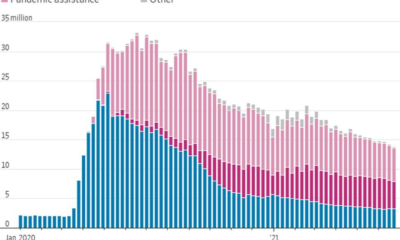Latest
Families across Canada know that affordable child care is not a luxury

The Prime Minister, Justin Trudeau, and the Premier of Manitoba, Heather Stefanson, today announced that Manitoba will achieve an average of $10-a-day regulated child care on April 2, 2023 – three years ahead of the national target. This milestone achievement could save families hundreds of dollars per child, per month on average.
This announcement comes less than two years after the governments of Canada and Manitoba reached an agreement to support an average of $10-a-day regulated child care in the province. Already, families in nearly half of Canada’s provinces and territories are benefitting from regulated early learning and child care at an average of $10-a-day or less, and fees have been cut by at least 50 per cent in all other jurisdictions, with work on track to deliver $10-a-day child care on average by March 2026.
Delivering $10-a-day child care across the country is a key part of the federal government’s plan to make life more affordable for Canadians. It builds on a wide range of other support programs, including the Canada Child Benefit, which puts more money into the pockets of nine out of 10 Canadian families with children and has helped lift hundreds of thousands of children out of poverty. We will continue to put Canadian families at the heart of everything we do, as we make life more affordable, create good jobs, and grow the economy to benefit all Canadians.
Quotes
“Reaching $10-a-day child care on average is a huge milestone achievement for families in Manitoba. It means hundreds of dollars per child back in the pockets of hard-working families every month, it means more jobs in early learning and child care, it means a stronger economy for Manitoba, and it means we’re giving every child the best possible start in life.”The Rt. Hon. Justin Trudeau, Prime Minister of Canada
“By working together, Canada and Manitoba have achieved our shared goal of affordable child care. We will continue to work together to achieve other important targets, such as space creation and support to early childhood educators, to ensure that every family has access to high-quality, affordable, flexible, and inclusive child care.”The Hon. Karina Gould, Minister of Families, Children and Social Development
“Our government recognizes that in order for Manitobans to be able to participate in the workforce, upgrade their skills and training, support their families, and play an active role in the growth of our communities and economy, access to affordable and high-quality child care is essential. Our government is proud to work in partnership with Canada to strengthen and grow Manitoba’s early learning and child care system in all communities of our province. Today, we are proud to announce that with the significant initiatives we have implemented over the past few years to lower parent fees and build capacity in the system, Manitoba is going above and beyond our commitment by maxing all parent fees to $10 a day for children 12 and under for regular hours of care, and we are achieving this historic goal three years ahead of schedule.”The Hon. Heather Stefanson, Premier of Manitoba
“Manitoba has been working diligently to strengthen the continuum of child care services available for Manitoba families to improve access to high-quality, affordable, inclusive child care. We expanded the child care subsidy to prioritize families most in need; we provided new, ongoing operating grants to support the creation of over 3,100 affordable child care spaces; and we implemented a wage grid to support the dedicated staff working in the early learning and child care sector. Our government is pleased to work collaboratively with our federal partners to deliver on this important initiative to provide accessible, affordable child care to Manitoba families.”The Hon. Wayne Ewasko, Manitoba’s Minister of Education and Early Childhood Learning
Quick Facts
- In August 2021, Canada and Manitoba announced an agreement to significantly improve early learning and child care for all children in the province, with the Government of Canada contributing approximately $1.2 billion for the early learning and child care sector in Manitoba over five years.
- Additionally, nearly $98 million was announced in February 2022 through the Canada-Manitoba Early Learning and Child Care Agreement – 2021 to 2025, including a one-time investment of nearly $19.2 million to support the early childhood workforce.
- Through previous investments in early learning and child care, the Government of Canada already helped create more than 730 affordable child care spaces in Manitoba – and over 40,000 across the country – prior to the pandemic.
- With support from federal funding, Manitoba aims to create 23,000 new child care spaces as part of the Canada-wide system by 2026, to improve access to affordable child care for families. More than 3,300 of these spaces have been announced to date.
- As part of Budget 2021, the Government of Canada made a transformative investment of more than $27 billion over five years to build a Canada-wide early learning and child care system with provinces and territories. Combined with other investments, including in Indigenous early learning and child care, up to $30 billion over five years will be provided in support of early learning and child care.
- Delivering a high-quality, inclusive, and affordable Canada-wide early learning and child care system is good for families and the economy. TD Economics has pointed to a range of studies that have shown that for every dollar spent on early childhood education, the broader economy receives between $1.50 and $2.80 in return. And in Quebec, affordable child care alone has raised the province’s GDP by 1.7 per cent.
Families across Canada know that affordable child care is not a luxury ‒ it is a necessity. With global inflation driving up the cost of living and making it harder for families to make ends meet, the Government of Canada has been working with provinces and territories to deliver on our promise of $10-a-day child care – putting more money back in the pockets of Canadian families, driving economic growth that benefits everyone, and giving children the best possible start in life.
The Prime Minister, Justin Trudeau, and the Premier of Manitoba, Heather Stefanson, today announced that Manitoba will achieve an average of $10-a-day regulated child care on April 2, 2023 – three years ahead of the national target. This milestone achievement could save families hundreds of dollars per child, per month on average.
This announcement comes less than two years after the governments of Canada and Manitoba reached an agreement to support an average of $10-a-day regulated child care in the province. Already, families in nearly half of Canada’s provinces and territories are benefitting from regulated early learning and child care at an average of $10-a-day or less, and fees have been cut by at least 50 per cent in all other jurisdictions, with work on track to deliver $10-a-day child care on average by March 2026.
Delivering $10-a-day child care across the country is a key part of the federal government’s plan to make life more affordable for Canadians. It builds on a wide range of other support programs, including the Canada Child Benefit, which puts more money into the pockets of nine out of 10 Canadian families with children and has helped lift hundreds of thousands of children out of poverty. We will continue to put Canadian families at the heart of everything we do, as we make life more affordable, create good jobs, and grow the economy to benefit all Canadians.
Quotes
“Reaching $10-a-day child care on average is a huge milestone achievement for families in Manitoba. It means hundreds of dollars per child back in the pockets of hard-working families every month, it means more jobs in early learning and child care, it means a stronger economy for Manitoba, and it means we’re giving every child the best possible start in life.”
The Rt. Hon. Justin Trudeau, Prime Minister of Canada
“By working together, Canada and Manitoba have achieved our shared goal of affordable child care. We will continue to work together to achieve other important targets, such as space creation and support to early childhood educators, to ensure that every family has access to high-quality, affordable, flexible, and inclusive child care.”
The Hon. Karina Gould, Minister of Families, Children and Social Development
“Our government recognizes that in order for Manitobans to be able to participate in the workforce, upgrade their skills and training, support their families, and play an active role in the growth of our communities and economy, access to affordable and high-quality child care is essential. Our government is proud to work in partnership with Canada to strengthen and grow Manitoba’s early learning and child care system in all communities of our province. Today, we are proud to announce that with the significant initiatives we have implemented over the past few years to lower parent fees and build capacity in the system, Manitoba is going above and beyond our commitment by maxing all parent fees to $10 a day for children 12 and under for regular hours of care, and we are achieving this historic goal three years ahead of schedule.”
The Hon. Heather Stefanson, Premier of Manitoba
“Manitoba has been working diligently to strengthen the continuum of child care services available for Manitoba families to improve access to high-quality, affordable, inclusive child care. We expanded the child care subsidy to prioritize families most in need; we provided new, ongoing operating grants to support the creation of over 3,100 affordable child care spaces; and we implemented a wage grid to support the dedicated staff working in the early learning and child care sector. Our government is pleased to work collaboratively with our federal partners to deliver on this important initiative to provide accessible, affordable child care to Manitoba families.”
The Hon. Wayne Ewasko, Manitoba’s Minister of Education and Early Childhood Learning
Quick Facts
In August 2021, Canada and Manitoba announced an agreement to significantly improve early learning and child care for all children in the province, with the Government of Canada contributing approximately $1.2 billion for the early learning and child care sector in Manitoba over five years.
Additionally, nearly $98 million was announced in February 2022 through the Canada-Manitoba Early Learning and Child Care Agreement – 2021 to 2025, including a one-time investment of nearly $19.2 million to support the early childhood workforce.
Through previous investments in early learning and child care, the Government of Canada already helped create more than 730 affordable child care spaces in Manitoba – and over 40,000 across the country – prior to the pandemic.
With support from federal funding, Manitoba aims to create 23,000 new child care spaces as part of the Canada-wide system by 2026, to improve access to affordable child care for families. More than 3,300 of these spaces have been announced to date.
As part of Budget 2021, the Government of Canada made a transformative investment of more than $27 billion over five years to build a Canada-wide early learning and child care system with provinces and territories. Combined with other investments, including in Indigenous early learning and child care, up to $30 billion over five years will be provided in support of early learning and child care.
Delivering a high-quality, inclusive, and affordable Canada-wide early learning and child care system is good for families and the economy. TD Economics has pointed to a range of studies that have shown that for every dollar spent on early childhood education, the broader economy receives between $1.50 and $2.80 in return. And in Quebec, affordable child care alone has raised the province’s GDP by 1.7 per cent.
Latest
A drug company abandoned a treatment for ‘bubble boy disease.’ After a 5-year fight, this little girl is about to get it

Later this spring, a little girl in California who essentially has no immune system will receive a lifesaving treatment for “bubble boy disease” thanks to the persistence of a dogged group of parents, a pediatrician, a veteran newsman and a few episodes of “Grey’s Anatomy.”
Five-year-old Seersha Sulack has the same rare disease portrayed in the 1976 John Travolta movie, “The Boy in the Plastic Bubble.” A germ – even a common cold – could kill her, and so she stays away from anyone outside her immediate family.
The treatment she’s been waiting for had stunning, near-perfect results in a clinical trial, but it’s been sitting on the shelf for years in the US because the pharmaceutical company that once owned the license abandoned it when it decided not to not to pursue approval from the US Food and Drug Administration.
“It’s a pretty tough situation,” said Dr. P.J. Brooks, acting director of the Division of Rare Diseases Research Innovation at the National Institute of Health’s National Center for Advancing Translational Sciences. “You have an effective therapy like (this one) and people can’t get access to it.”
Seersha is expected to get the treatment next month. She’ll become only the second child in the US in the past five years to receive it; the first child received it earlier this month.
The treatment is for a particular type of severe combined immunodeficiency called ADA-SCID that’s extremely rare – in the US, eight babies a year are born with it. Currently, 26 children in the US and Canada are on the waiting list to get the therapy, according to Dr. Donald Kohn, a UCLA scientist who has been working on the treatment for nearly 40 years.
The treatment is a type of gene therapy: Doctors will give Seersha a normal copy of the defective gene that disabled Seersha’s immune system.
Gene therapies hold great hope for all sorts of diseases, but they’re very expensive to develop, and pharmaceutical companies can’t be sure that they’ll make a profit because health insurance companies haven’t always agreed to pay the multi-million dollar price tags.
“It has not escaped our attention at FDA that there have been some clouds on the horizon in gene therapy,” Dr. Peter Marks, head of the US Food and Drug Administration’s Center for Biologics Evaluation and Research, said at a biotech conference in California in October. “We really want to try to see what we can do to move things forward.”
The gene therapy Seersha’s been waiting for was once called OTL-101, for Orchard Therapeutics Limited. Orchard launched in 2016 with OTL-101 as its “lead candidate,” but four years later, the company announced it would “reduce investment” in the therapy and prioritize treatments for more common conditions.
“A lot of us were upset and angry,” said Seersha’s mother, Shayla Sulack, noting that OTL-101 was developed with millions of dollars in state and federal government aid.
“We were always, ‘it’s going to happen, it’s going to happen,’ ” she added. Then, after Orchard decided not to pursue the therapy, “a bunch of us SCID moms were like, ‘Excuse me?’ ”
In a statement to CNN, an Orchard spokesperson wrote that “after encountering technical challenges related to the commercial-grade manufacture of this particular therapy, we made the very difficult decision to limit additional investment in [the SCID gene therapy].” The spokesperson spoke on the condition of anonymity.
A mother’s ‘oh, crap’ moment
Shayla and her husband, Stephen Sulack IV, were high school sweethearts at Tehachapi High School, about 100 miles north of Los Angeles. In 2010, when she was 18 and he was 19, they married at the Little White Wedding Chapel in Las Vegas.
Stephen was in the Army, and over the next few years, the young couple moved to various military bases. Their daughter Skylar was born in 2012 and son Stephen V in 2014.
In 2017, the family moved to Hawaii for Stephen’s new post as a Black Hawk helicopter pilot at Schofield Barracks in Oahu. Two weeks later, Seersha was born at Tripler Army Medical Center in Honolulu.
Weighing 6 pounds and 10 ounces, Seersha appeared perfectly healthy, and her parents took her on family outings, going to Dole Plantation and Waikiki Beach when she was five days old.
Strolling around the shops near the beach that day, the family went into a Tesla dealership just for fun. While sitting in a showroom car, Shayla got a phone call from a number she didn’t recognize.
It was a geneticist at Tripler. He told Shayla that a routine blood test, a prick on a newborn’s heel done in nearly every state, showed Seersha’s level of T cells – a type of white blood cell crucial to fighting off infections – was just five. Normal T cell levels for newborns are around 3,000.
This meant any infection, no matter how small, could kill Seersha. The geneticist said to bring her back to the hospital at Tripler immediately.
Shayla says her first reaction was: “Oh, crap.”
Not only had they been going everywhere with their new baby, but Seersha’s big brother and sister had been affectionately pawing all over her.
Shayla and Stephen left the Tesla dealership and made the 20-minute drive to the hospital while Shayla’s parents took the older two children home in their car.
At Tripler, doctors explained more about SCID, and a psychologist was on hand to help the Sulacks deal with the shocking news.
Only about one baby a year is born with the SCID in Hawaii, according to Sylvia Mann, genetics coordinator at the state’s department of health.
The next day, Shayla and Seersha were on a military medical transport flight to Los Angeles. Seersha was in an incubator in the front of the plane, and the other patients were kept in the back to decrease the chances they could get her sick.
An ambulance drove Shayla and Seersha to UCLA Mattel Children’s Hospital, one of 47 medical centers in the US and Canada that specialize in SCID as members of the Primary Immune Deficiency Treatment Consortium funded by the National Institutes of Health.
Once there, doctors laid out the options for saving Seersha’s life.
Options for Seersha
It turned out none of them were very good.
ADA-SCID is treated with regular injections to replace a missing enzyme that helps with immune function. They help a great deal, but they don’t give the child a full immune system, and their effectiveness can wane over time.
The UCLA doctors laid out two longer-term options. Seersha could receive a stem cell transplant, which is lifesaving and the standard treatment for SCID. Doctors would test her mother, father, brother, and sister and determine the best genetic match, and then would extract cells that specialize in forming blood cells and give them to Seersha.
Testing showed that any of her family members could donate to her, but none of them was a particularly good match. This was bad news for two reasons: One, the transplant likely wouldn’t be as effective. Two, Seersha would be more likely to suffer complications.
Latest
Youssef Ramadan earns ACC Men’s Swimmer of the Year

After his historical season, Youssef Ramadan took the ACC Men’s Swimmer of the Year title for the 2022-23 season, the league announced Monday afternoon.
Ramadan became the first-ever national champion in program history, swimming the second-fastest 100 fly time in NCAA history at 43.15. He earned five All-American awards and two honorable mentions at NCAA’s.
Ramadan was named male MVP at ACC’s in February for the second year in a row, on top of two gold medals and two silver medals. He also took ACC Male Swimmer of the Week twice earlier in the season.
Throughout the 2022-23 season, he’s broken four individual school records and two relay records.
Latest
Changes on tap for Americans who hunt waterfowl in Manitoba

Americans planning to hunt waterfowl this fall in Manitoba will be able to draw a seven-day license but must enter a lottery for a limited number of “foreign resident” licenses in subsequent years if they don’t book their trip through an outfitter, under new waterfowl regulations the province announced earlier this month.
“As part of the initial phase-in strategy for fall of 2023, Manitoba is ensuring that all applicants for the draw will receive a seven-day Foreign Resident Migratory Game Bird License,” Manitoba’s Ministry of Natural Resources and Northern Development said on its website. “In subsequent years the allocations for each license type will be determined based on license sales, hunter questionnaire data from all user groups and stakeholder input. The combination of the seven-day license and associated draw for freelance foreign resident hunters is intended to discourage visiting hunters from creating lasting systems of control that inhibit other hunters.”
The new regulations are a key component of the Waterfowl Hunting Modernization Project, a proposal the Manitoba government unveiled last fall before a 45-day comment period that ended Friday, Oct. 7.
American hunters will now have the opportunity to access the following Manitoba waterfowl and upland game bird licenses, the province said:
Foreign Resident Upland Game Bird License: Required to hunt upland birds and can be purchased online and is subject to the same regulatory framework as resident hunters.
Foreign Resident Migratory Game Bird License: Required to hunt migratory birds and is a seven-day license, which can be accessed either by entering a draw process or booking with a licensed outfitter.
Foreign Resident Legacy Migratory Game Bird License: A grandfathered opportunity for qualifying foreign resident landowners or lessees of Crown land.
To qualify for the special grandfathered provisions, Americans (and other foreign residents) must have owned property in Manitoba before Sept. 1, 2022, and still own that property; be a shareholder of a corporation owning registered property in Manitoba; or be a crown land lessee. Eligible land interest holders must also have hunted waterfowl in Manitoba during the previous five years between 2018 and 2022 to qualify for the legacy license.
-

 Business2 years ago
Business2 years agoHyundai Leads Industry in U.S. News & World Report 2023 Best Cars for the Money Awards
-

 Innovation2 years ago
Innovation2 years agoJay-S ventures into the urban genre with “Bailar en la Playa” his latest production
-

 Business2 years ago
Business2 years agoThree Questions Small Business Owners Should Ask In Creating A Workplace Culture – Forbes
-

 Business2 years ago
Business2 years agoA Fintech Makes It Easy For Small Businesses To Offer 401(k) Retirement Benefits – Forbes
-

 Business2 years ago
Business2 years agoBritain’s Small Businesses See Better Times Ahead But Is Their Optimism Justified? – Forbes
-

 Money2 years ago
Money2 years agoCharlie Crist leads Democratic gubernatorial field again in money chase – Florida Politics
-

 Money2 years ago
Money2 years agoTesting New Tools for Horizon Worlds Creators To Earn Money
-

 Business2 years ago
Business2 years agoSmall Business Labor Shortage – Forbes
